

Centuries ago, barbers often pulled double duty: cutting hair and providing health care. When they needed to, they acted as self-trained surgeons, pharmacists, and dentists. While that practice fell away as the practice of medicine and surgery professionalized beginning in the 19th century, the concept has been reinvigorated in some communities where salons and barbershops are a key community gathering place. For instance, barbershops in predominantly black neighborhoods have become effective partners in the fight against the high rates of hypertension, especially in men. Through Penn’s Cut Hypertension program, medical students set up shop at Philly Cuts and Makkah Barbershop in West Philadelphia every Saturday to deliver blood pressure screenings and talk about managing hypertension with the patrons while they wait for a haircut. The casual nature of a barbershop creates an ideal and engaging environment to discuss their health, the risks affecting it, or the barriers to improvement.
“It’s an open conversation,” said Canada Montgomery, a second-year medical student at the Perelman School of Medicine and coordinator for Cut Hypertension. “I think allowing a space for people to be very honest and real in how they are feeling about these things is so important. I didn’t realize how impactful it would be.”
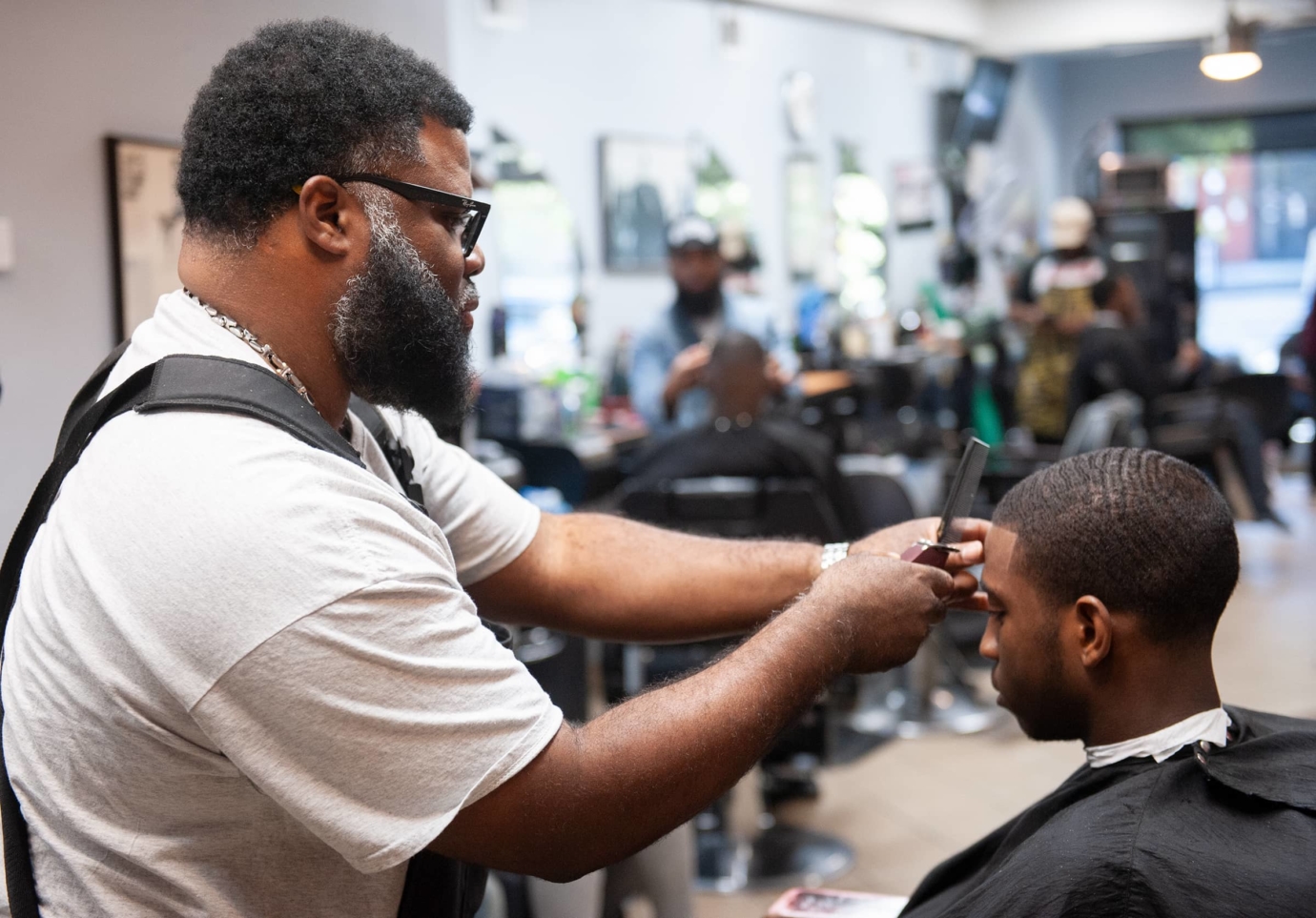
James “JB” Browne, a senior barber at Philly Cuts, trims a patron’s hair.
Health disparities motivated medical students from the Penn chapter of the Student National Medical Association, an independent organization focused on the needs and concerns of black medical students, to collaborate with Philly Cuts, an established barbershop with close ties to the community, back in 2010. Not only do black men face significantly higher rates of hypertension than the rest of the population, but they’re also less likely to seek medical attention, due to a host of factors, like a lack of trust in the medical community and insurance coverage shortfalls. Overall, more than 40 percent of both black men and women battle hypertension, which increases their risk for heart attacks, stroke, and death. The organizers knew one way to help close those gaps was to meet people where they often go to unwind and socialize. “To create a healthy lifestyle, everything starts with a healthy dialogue,” said Darryl Thomas, owner of Philly Cuts. “That was our intention.” And so, the Cut Hypertension barbershop partnership was created.
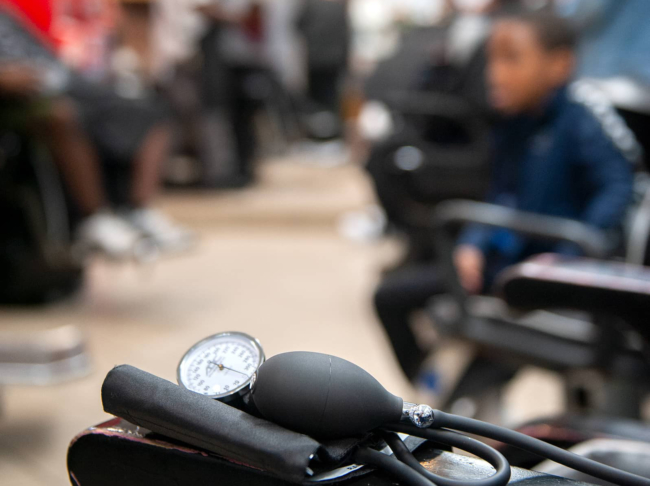
Today, Cut Hypertension is made up of five second-year medical student coordinators and about 15 first-year medical student volunteers, along with several Penn graduate and nursing students. Every Saturday, a coordinator leads a team of volunteers for sessions in the morning and afternoon at Philly Cuts, and every other Saturday at Makkah Barbershop, a predominantly Middle Eastern barbershop the program added in 2019. Over 300 students have volunteered through Cut Hypertension since its inception.
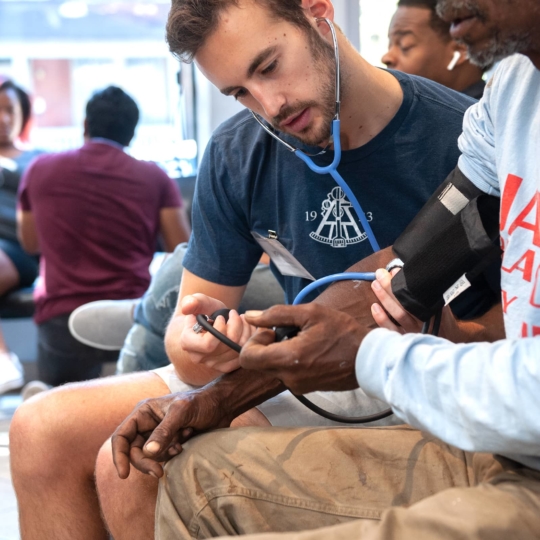
At Philly Cuts, the students first huddle on the third floor to review the activities for the hour-long session. They’ll practice taking each other’s blood pressure and go over the health materials they plan to distribute that day, before heading down to the first floor, cuffs in hand, to engage with the barbers and patrons. “Are you interested in having your blood pressure taken?” can kick start a conversation about a wide range of issues. “It’s not just about blood pressure,” Montgomery said. The goal is to help people be their own health advocate. “They’re more health conscious about what they eat and learn how stress increases the risk of many different cardiovascular conditions,” she said. “And they know that cutting back on smoking is important.”
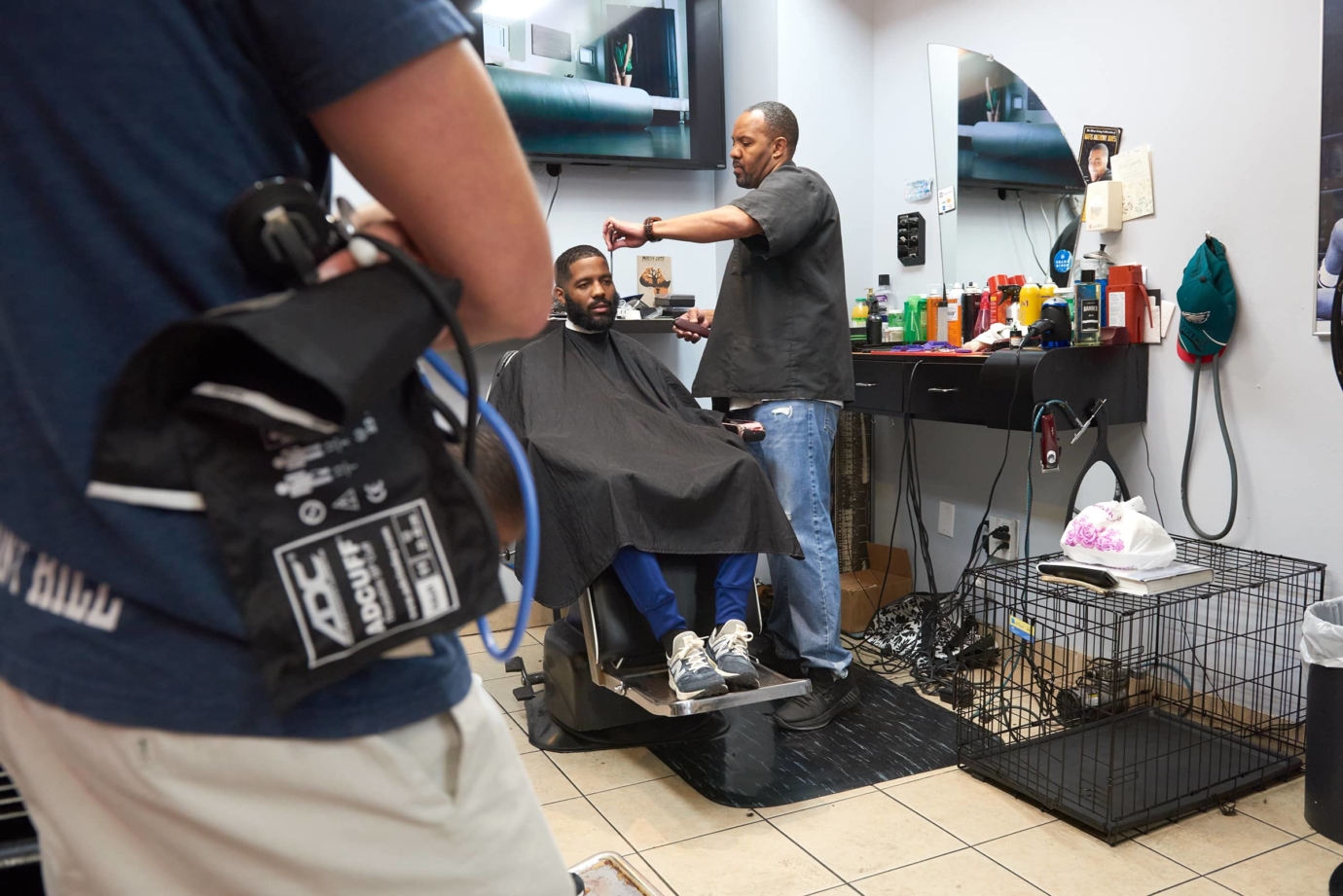
A medical student stands by as the owner of Philly Cuts, Darryl Thomas, cuts a patron’s hair.
What makes the program such a success is the barbers. Thomas and barber James “JB” Browne are invaluable partners—and health advocates in their own right—who help create a positive and safe space, where medical students can more easily approach the patrons and their families. It’s about relationship building. “We act as the gatekeepers, and when we allow Penn students to come in, then the community lends some trust to them,” Thomas said.
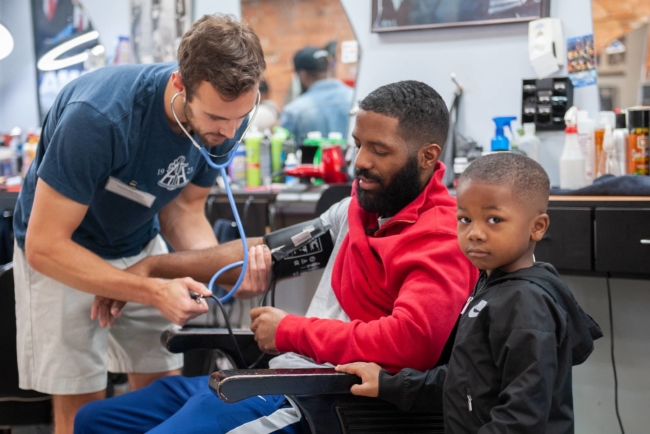
The medical students take readings and spend time discussing the results with the patrons and their families, offering ways to help track their blood pressure, via smartphone apps, for example, or pointing them to other resources and clinical care. “The feedback is great,” Thomas said. “The dialogue, the content, and the awareness are there. And it’s being shared, so that’s a start.” Thomas hears some of his regulars who are amputees or have lost their eyesight chat with other patrons about the importance of getting health checks. Others joke about putting too much sugar in coffees. The barbers hit the gym more, he said, and patrons noticeably reach more for the water than soda in the shop’s vending machine. “You see the older teach the young, and then the older ones are very proud of the young,” he said. “It’s tremendous.”
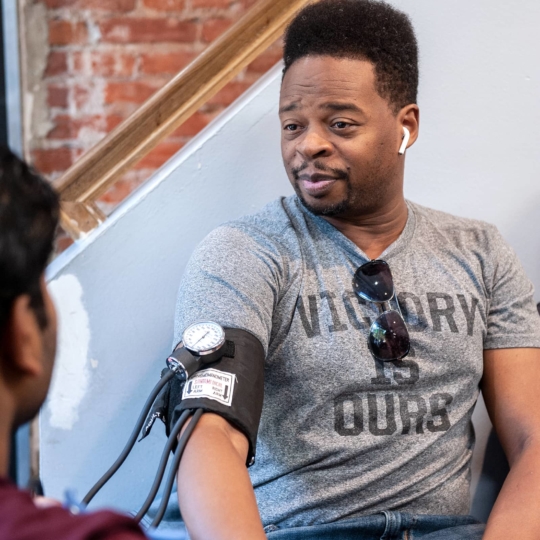
A growing body of evidence shows the barbershop interventions work. A 2018 study in the journal Circulation found that screening patrons and prescribing medications in barbershops significantly lowered blood pressure levels in black men with hypertension after one year. Another study in the New England Journal of Medicine in 2018 found that 63.6 percent of black men exposed to health promotion in a barbershop had blood pressure levels lower than 130 over 80 compared to 11.7 percent who had no intervention.
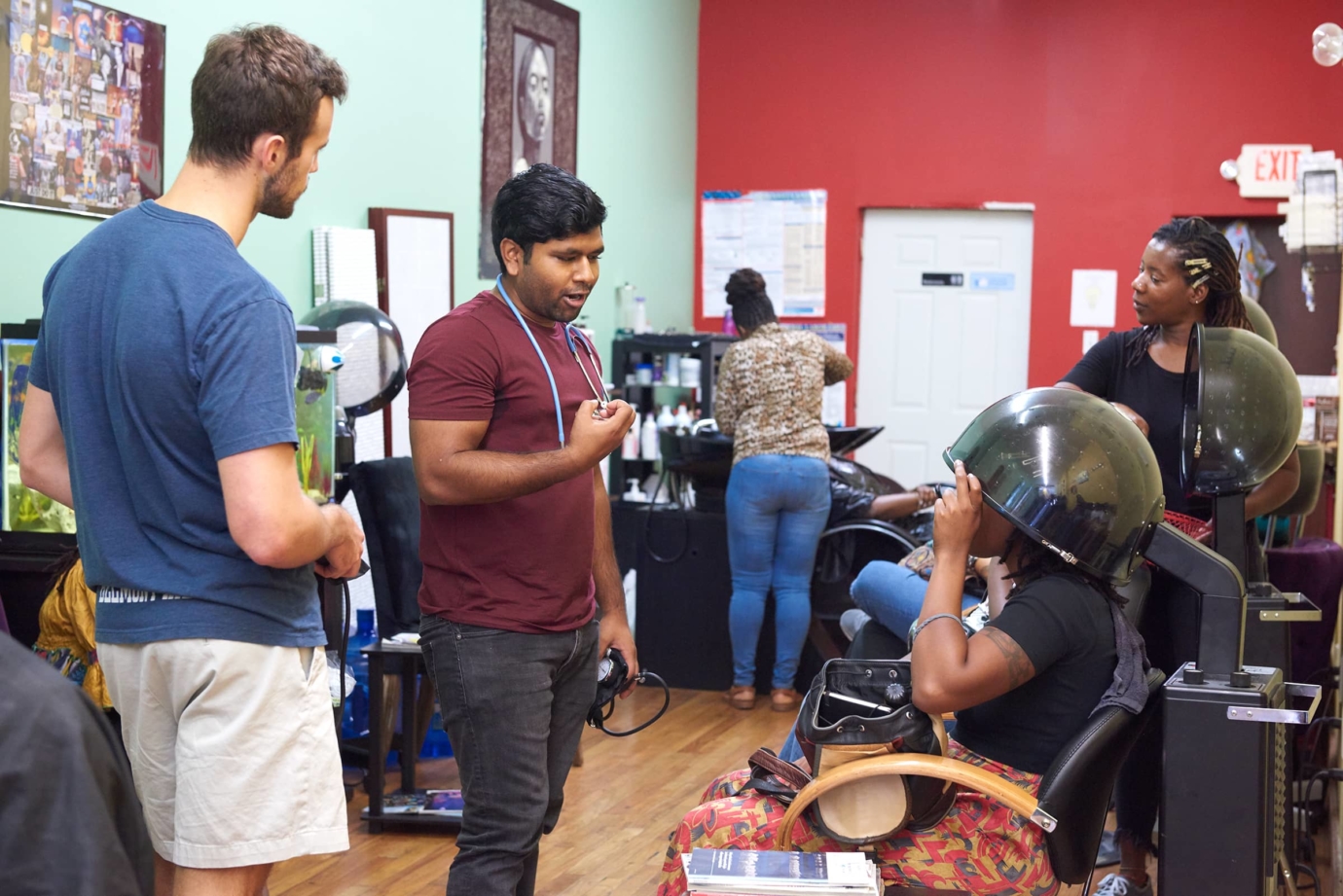
Tom Sommers and Edward Gomes speak with a patron at a hypertension session at Philly Cuts.
In 2019, Cut Hypertension branched out beyond blood pressure. Coordinators have started a health series with “mini-presentations” that covers topics the patrons requested, including diabetes, mental health, and substance abuse. Substance abuse specialists came to Philly Cuts to train the barbers and patrons on how to use Narcan, an antidote to reverse an opioid overdose, and distributed the treatment. Nutrition and cancer screening talks are on the docket, too.
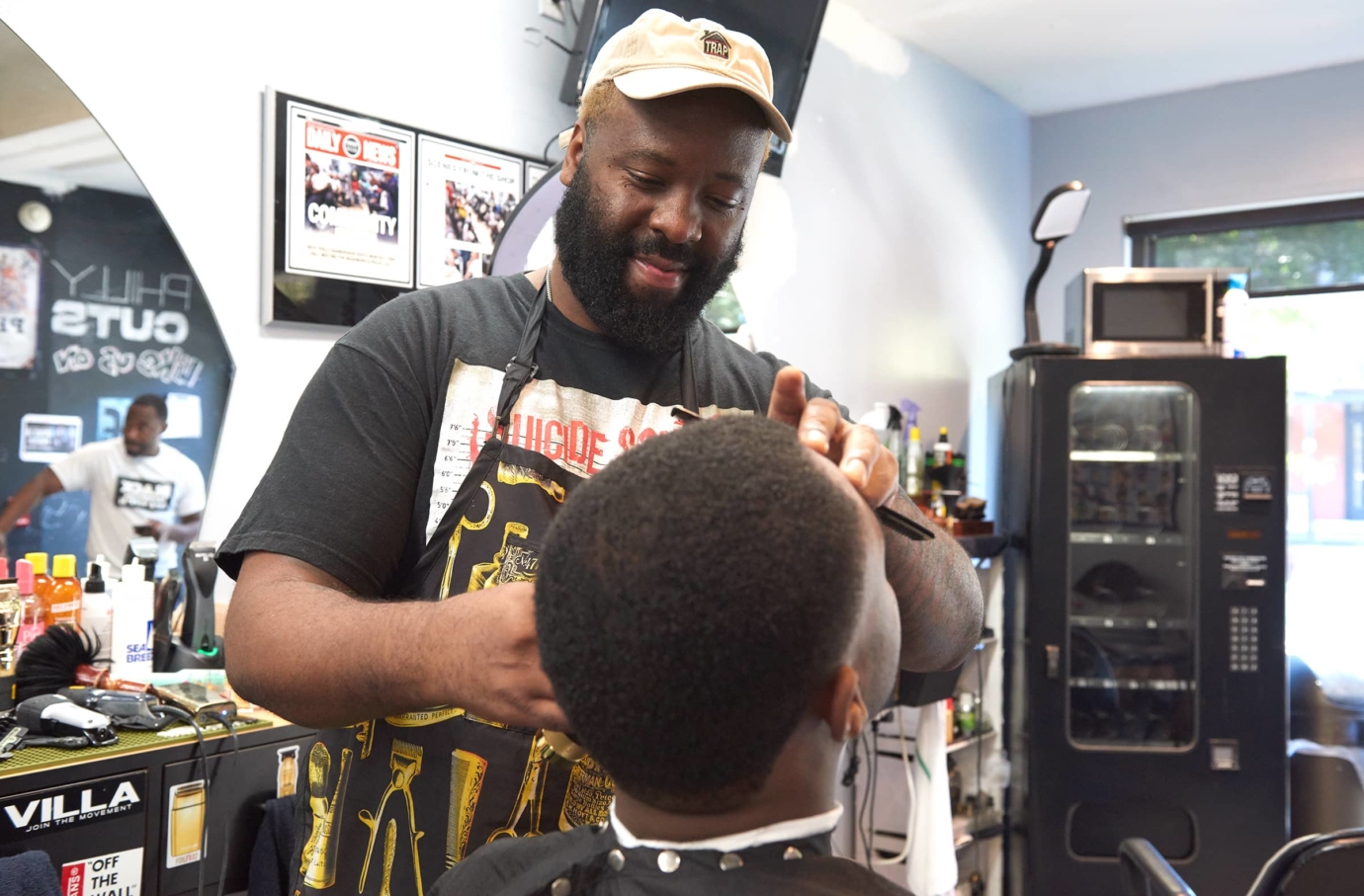
Maurice Anderson trims a patron’s hair at Philly Cuts.
Cut Hypertension has also expanded to other cities since first starting at Penn 10 years ago.
Kenji Taylor, MD, who helped create the program when he was a medical student, went on to establish chapters in Atlanta and San Francisco. He even turned it into a career. Today, he works at Stanford University School of Medicine as a faculty member researching the implementation of the work nationally and building upon the Cut Hypertension program. In spring 2020, he’s leading a first-of-its-kind event in Portland, Ore., called the Barbershop Health Convention, to bring together programs from 10 cities across the country. Thomas and Browne are set to join him.
“The program continues to grow,” Taylor said. “And more importantly, the concept of innovative community-based, co-led initiatives to better the health of African American communities continues to expand.”
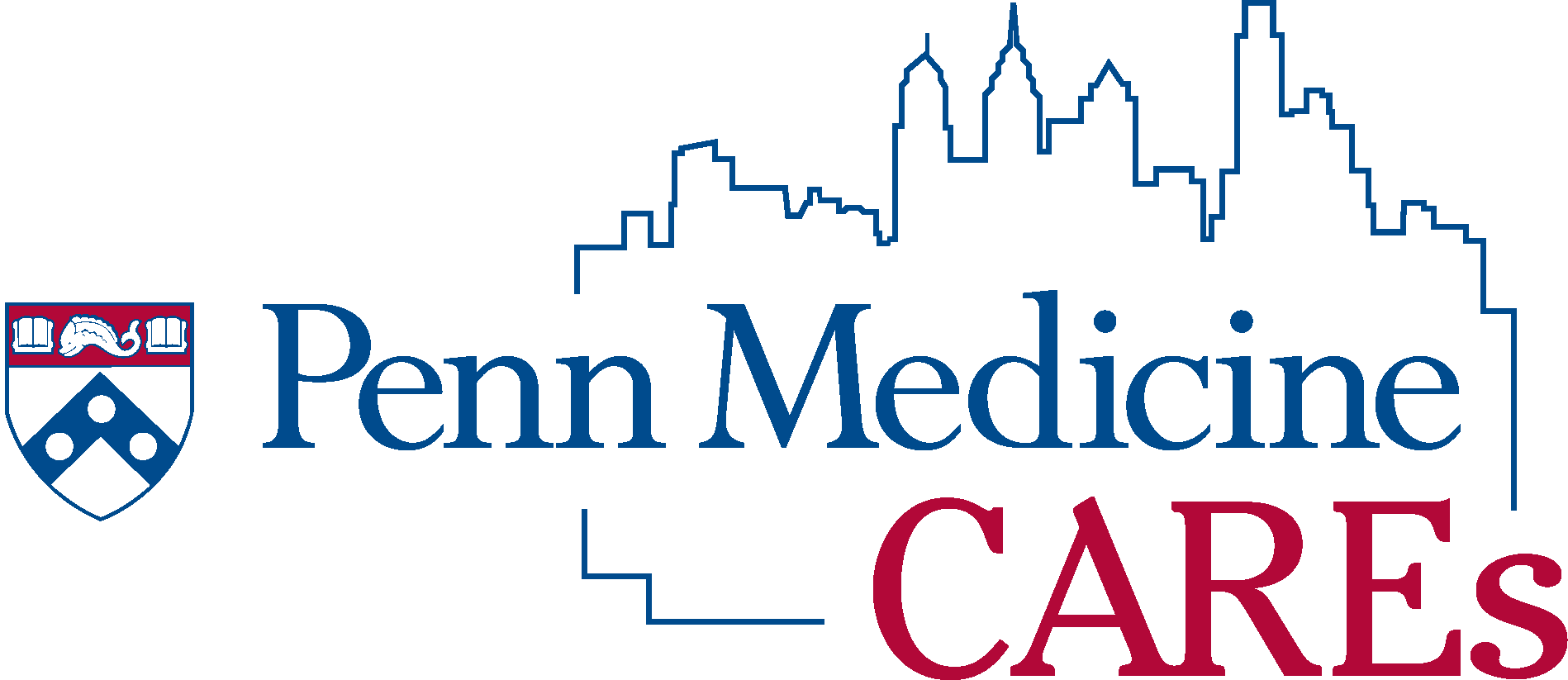


 A Decade of Cutting Hair and Health Risks
A Decade of Cutting Hair and Health Risks





